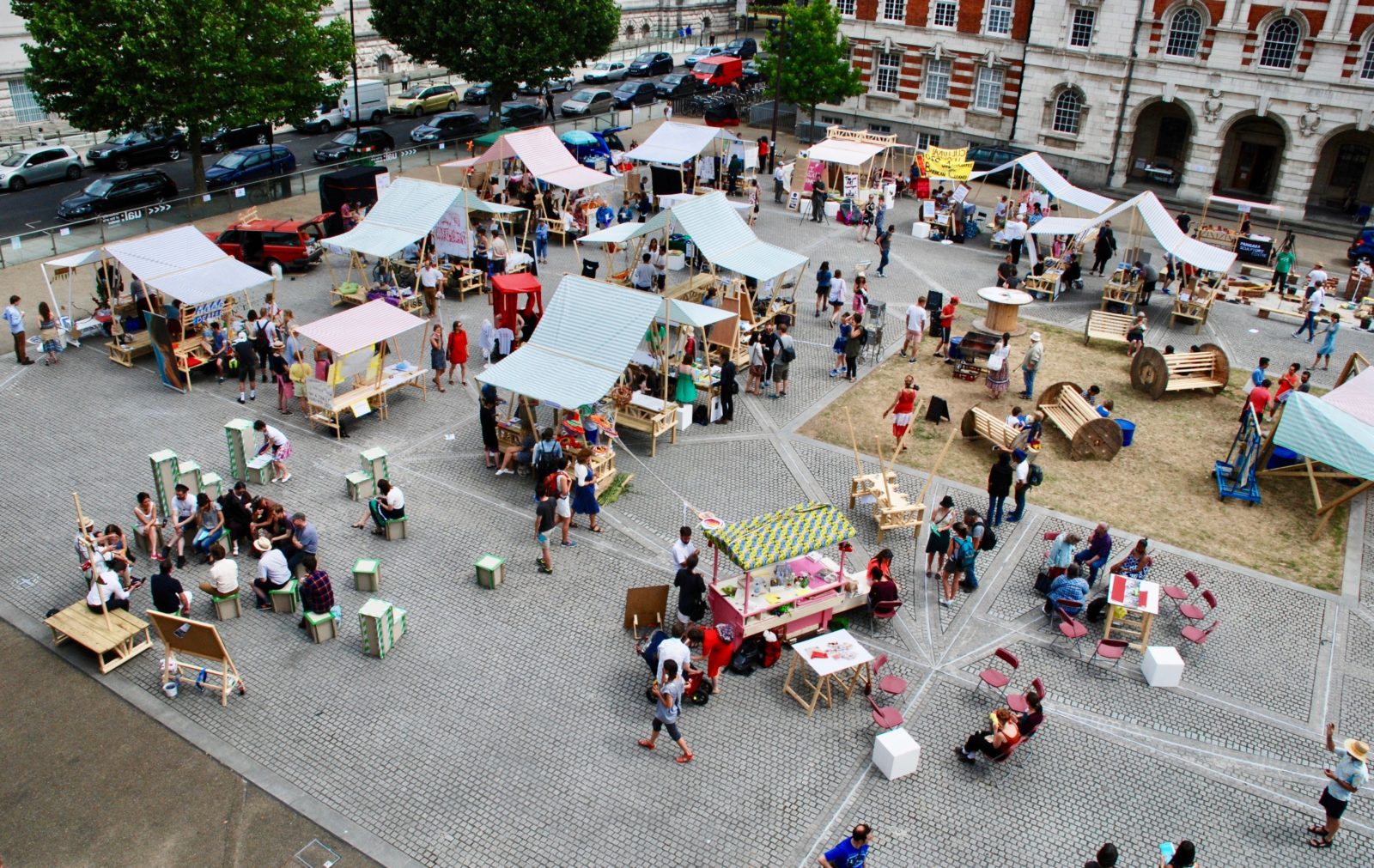![/head/issue/sites/head_issue/files/migrations/inline-images/4_MKB-1024x716.jpeg [missing img]](/head/issue/sites/head_issue/files/migrations/inline-images/4_MKB-1024x716.jpeg)
Artist, academic and activist David Cross wearing his graduation robes from the Royal College of Art and dressed as the zombie at <em>TransActing: A Market of Values</em> at Chelsea College of Arts, London (2015). Photo credit: Marsha Bradfield.
![/head/issue/sites/head_issue/files/migrations/inline-images/2_MKB-1024x791.jpeg [missing img]](/head/issue/sites/head_issue/files/migrations/inline-images/2_MKB-1024x791.jpeg)
Chipping away at the ice block that artist Afshin Dehkordi used to examine diminishing value. Part of the stall for Open School at <em>TransActing: A Market of Values</em> at Chelsea College of Arts, London (2015). Photo credit: Doris Koch.
![/head/issue/sites/head_issue/files/migrations/inline-images/3_MKB-1024x431.jpeg [missing img]](/head/issue/sites/head_issue/files/migrations/inline-images/3_MKB-1024x431.jpeg)
<em>TransActing: A Market of Values</em> at Chelsea College of Arts, London (2015) facilitated by Critical Practice. Photo credit: Kuba Szreder.
My sustainable sensibility for creative practice aspires to buck the logic of the ‘latest and loudest’ that drives hyperproduction and overexposure.Eschewing novelty and trends, I want to focus on practice that is small and slow - practice that models modest methods to raise awareness about the qualities of the sustainability that distinguish each approach. I want to celebrate examples, however partial, fragile or otherwise imperfect. I want to invest in communities of evaluation: constellations that are more sensitive to a heterogenous range of values and the nonbinary potential beyond value creation/value extraction. This responds to economist Mariana Mazzucato’s call to action: If the goal is to produce smart growth that is more inclusive and sustainable, we need better and more complex understandings of value.[note]Mariana Mazzucato, The Value of Everything: Making and Taking the Global Economy, London: Penguin, 2018.[/note] As a cultural producer, I am committed to challenging the logic of winner-takes-all to instead nurture an authorial ethos where more nuanced value recognition and distribution take pride of place. I accept this is not especially sexy work. It avoids the attention economy when it finds form in low-visibility networks whose activity is situated and specific. Often small-scale and typically slow-paced, this activity fails to attract the fanfare and funding garnered by what is latest and loudest. Consequently, mutual support becomes essential to value systems that are alternative to the norm. Those of us involved constellate and re-constellate, with this sometimes resulting in solidarities that are as awkward as they are necessary.[note]Incidental Unit, available at https://incidentalunit.org/ (last accessed 3.10.2023).[/note]
My sustainable sensibility for creative practice holds fast to the spiral that moves action research forward through cycles of personal and professional iteration.This is research in its most literal sense, albeit irreducible to ‘looking again’ and the ocularcentrism this implies. This approach forgoes the act of making new work for the sake of it to deepen our relationship with past practice. Why don’t we review and resource old work more often? This is not just a practical question or an ethical call to reflect on our individual experience. This question stems from a deep epistemological concern, fundamental to practice as an interface for encountering and making sense of the world and ourselves. No longer can I think of this as an adventure that is entirely ahead of me. Most of us have already collected heaps of resources: our notes, studies, sketchbooks, drafts, images, publications, lectures, voice memos and other recordings. As we demystify the black boxes we affectionately call our ‘personal archives’, we come face-to-face with our past selves, replete with their hopes and dreams. How can these histories guide our futures?
My sustainable sensibility for creative practice embraces the unconventional and the counterintuitive.For instance, Wikipedia tells us that ‘extractivism’ as a concept comes from the Portuguese, ‘extractivismo’; and when coined in 1996, the term described the for-profit exploitation of Brazilian forests.[note]“Extractivism”, in Wikipedia, available athttps://en.wikipedia.org/wiki/Extractivism (last accessed 3.11.2023).[/note] The role played by extractivism in climate crisis helps to explain why today the phrase ‘extracting value’ has a de facto negative connotation. Yet we also know that not all value extraction is created equal, and these differences depend, of course, on the value involved. Consider wisdom as a case in point. Layers of experience are pressed together as we activate our memory through sensemaking and calibrate it in context. As we dig into our knowledge and pull out a precious gem, we are enacting a kind of metaphorical extractivism. While there is good reason to lament extractivism as an economic model for exploitation, the act itself is not inherently bad. In this spirit, we must not shy away from thinking against connotations and evolving new denotations. Critical and creative forms can help us to challenge the status quo of meaning - to disrupt the business as usual of language - in the worlds of art and beyond.
![/head/issue/sites/head_issue/files/migrations/inline-images/5_MKB-714x1024.jpg [missing img]](/head/issue/sites/head_issue/files/migrations/inline-images/5_MKB-714x1024.jpg)
Open-access publication celebrating <em>TransActing: A Market of</em><br /><em>Values</em> and the tenth anniversary of Critical Practice (Intellect, 2023).<br />Download the open-access PDF <a href="https://drive.google.com/file/d/1BXZl-A3el2rVlo3kSGiS9dfWuJEURss2/view"…;. Photo credit: Neil Farnan.
